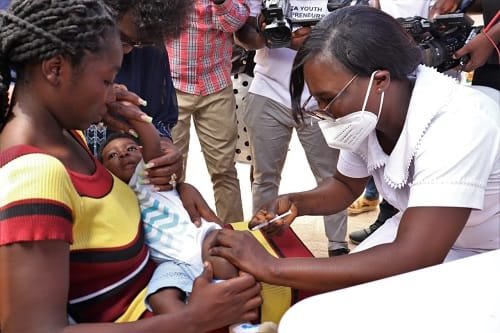The World Food Programme (WFP) in Nigeria will gulp $2.5 billion over the next five years, according to the Programmes’ Country Strategic Plan (CSP 2023-2027).
CSP is WFP support framework for Nigeria within the integrated United Nations Sustainable Development Framework jointly developed by all the UN Agencies in Nigeria.
“The Food Systems Transformation Pathways” is the outcome of Exploratory Dialogue in Nigeria in 2021 that produced 78 priority actions that will change the narrative on Food from the farm to the dining table.
Representative and Country Director of the WFP, Mr David Stevenson, said, on Thursday, during an audience with the Minister of State for Budget and National Planning, Prince Clem Ikanade Agba, that the programme would cover the Northeast, Northwest and states hosting Cameroonian refugees.
According to the CSP: “To address the challenges posed by the deteriorating food and nutrition situation, WFP will integrate its dual mandate by working on the humanitarian-development-peace nexus, applying targeted emergency responses that save lives while opening shock-responsive pathways to rapid recovery and resilience using a gender transformative, nutrition mainstreaming, climate smart, and conflict sensitive approach.”
Stevenson said that the WFP focused on crisis response, resilience building and addressing the root causes of food insecurity and malnutrition with five fully integrated outcomes.
The outcomes included, among others, ensuring that people were better able to meet their urgent food and nutrition needs through provision of lifesaving, hunger-reducing support, integrated with prevention and treatment of acute malnutrition, for the people and communities most at risk during and in the aftermath of shocks, including returnees, refugees and internally displaced persons.
In its outcome two, which aims to ensure that people have better nutrition, health and education outcomes, WFP said it would pursue the programmatic integration of nutrition to ensure safe year-round access to adequate nutritious food and increased resilience for the people and communities most at risk, strengthening national capacities in the prevention of all forms of malnutrition.
The WFP said it would help to build community and household resilience to shocks and to open pathways to self-reliance through solutions that make food systems more productive, inclusive, equitable, environmentally sustainable, adapted to climate change and capable of delivering healthy and nutritious diets for all people to ensure that they (people) have improved and sustainable livelihoods.
The WFP team discussed the five components (outcomes) of the CSP as well as the programme’s effort in the Northeast zone on the provision of food to support the food system.
Stevenson said that there would be a stock-taking meeting in July, this year, in Rome.
The stock taking in Rome in July is to assess the level of Countries’ implementation of the UN Food Systems Transformation in Nigeria.
The WFP team took the opportunity of the meeting to discuss, with Prince Agba, Nigeria’s counterpart funding to the programme’s CSP in Nigeria.
The minister said that Nigeria’s Food System was in safe hands with Dr Sanjo Faniran, Director of Social development, as the National Convenor of the UN Food System for Nigeria.
Prince Agba had, four months ago, appointed Faniran as National Convenor for the UN Food system for Nigeria to replace Mrs Olusola Idowu who, before then, had retired from service as Permanent Secretary in the Ministry of Budget and National Planning.
The letter, to the United Nations Resident/Humanitarian Coordinator in Abuja, appointing him said: “Dr Faniran will work with all relevant stakeholders in the food system including our development partners, relevant government agencies at both national and subnational levels, NGOs/CSOs, UN/AUC Hub as well as the private sector in the implementation of all the priorities in the Food System Transformation Pathways for Nigeria.
“While reassuring you of the commitment of the Government of Nigeria to accelerate the achievement of the Sustainable Development Goals through holistic implementation of the food system transformation pathways for food security and poverty reduction, please accept my warm regards.”
The Conclave


